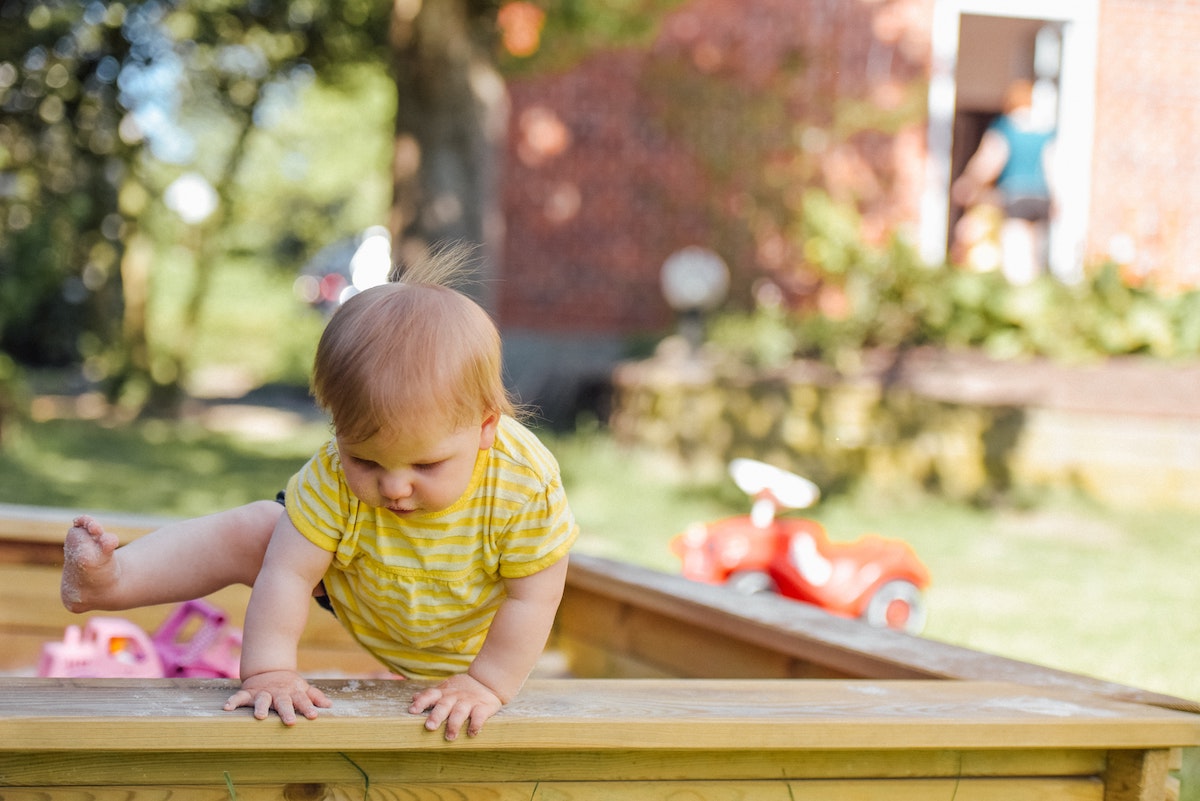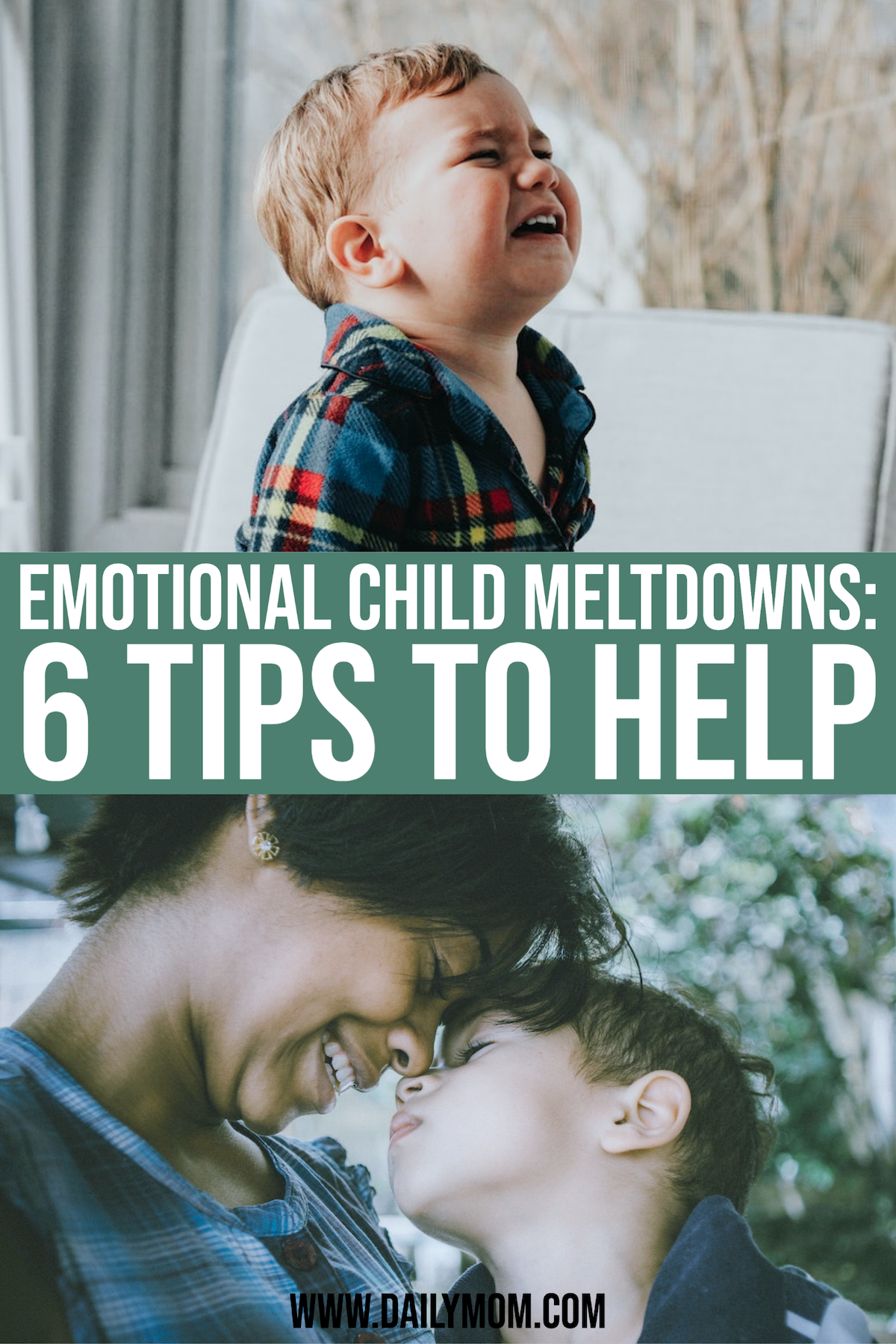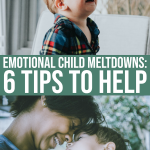Screaming tantrums, hitting, biting, and throwing are all of the least desirable behaviors of an emotional child and ones most parents would rather do without. The good thing about these behaviors, and yes there is something good, is that these behaviors are all signs of their emotional development and completely normal. They might be embarrassing at times and you might find yourself about to lose your mind when Olivia decides to hit Nora because she took her water bottle off the bench at the park, but before exploding on your child with reasoning and explanations, take a deep breath.
Whether this is your first child and the first time you are going through toddler initiation or whether you have three children, every child develops differently. Each child has a different temperament that can start as early as one year and by the time they are three, it starts to get better (although not gone) as their communication continues to develop. The great news, and this time it is truly great news, is that there are ways to teach your child how to respond appropriately in situations and start identifying their big feelings. Here are 6 easy tips to help you and your emotional child through this developmental stage.
Read More: Emotional Regulation, 6 Simple Ways To Help Your Child

Why Are Children So Emotional?
First, let’s talk about emotional development. It is just that, it is a developmental skill and can take some time to learn. Think about the first job you ever had or the first adult skill you learned when moving out and being on your own, it took some time to learn and it took a lot of practice. Heck, there are lots of skills as adults we are still trying to develop and may never get to where we want to be. Your emotional child is no different. They are learning will power, they are learning to make decisions, and they are learning they have a voice. So watch out world, we are raising strong, independent children.
As children turn one and they start to move more they want to experience any and all parts of their environment. They don’t know that chairs are not meant for standing on or that forks are only used to eat food and not comb their hair. Lacking the skills required for safe and appropriate behavior is something they will need a lot of guidance on and that’s where parents come in. From this point forward you are no longer working on strengthening muscles to crawl or walk, you are helping them use these muscles in ways they have never known before.
They are going to push boundaries, give you a sneaky side-eye before chewing on chalk for the 15th time and this is where setting boundaries is going to be your best friend. Using the word “no” is only going to get you so far. Your emotional child at that moment needs better options for their behavior. Instead of telling them over and over what they can’t do, tell them what they can do. Your child needs to feel safe and secure and they should be getting that from their parents. How, you might ask?
Read More: 5 Sensory Activities For Toddlers And Their Importance

6 Suggestions For Emotional Outbursts.
Dealing with an emotional child can be tricky and is going to take a lot of patience and practice keeping your cool. Once your child’s free will shows up it is game on. To be prepared for these tantrums, meltdowns, and defiance, here are 6 tips to help ease your potential frustration.
1. Respond Calmly. One of the hardest things to do as a parent is to keep your cool as your child is hitting, screaming, or even biting you because they are upset. As hard as that maybe, raising your voice or having any sort of knee jerk reaction is going to keep them going back for more. This sounds crazy, but hear us out.
Your child right now is learning boundaries and rules by your reactions and responses. If Hank is mad that you turned off his cartoons because it is time for lunch and starts biting your shoulder as you pick him up, yelling at him, telling him no or that he is a bad child, doesn’t make any positive changes to his behavior. By holding in a big reaction, hearing them and their emotions, and setting boundaries, this will show you are confidently in control.
2. Set Boundaries. All children need boundaries, all children will test those boundaries, and that is their job. As a parent, it is your job to keep those boundaries in place even if they seem to be pushing those boundaries over and over. Boundary setting is sometimes uncomfortable but realize that moving that boundary or removing it because it makes our emotional child unhappy is never going to prepare them for life.
Giving your child boundaries, in the long run, is going to decrease parental frustration. In addition to being firm on your boundaries, responding confidently and consistently the same way each time is going to let Susie know that hitting her brother is not acceptable at home, in the car, or at the park. Building healthy boundaries and rules for toddlers helps emotional outbursts and teaches them that they live in a safe, dependable environment.
Read More: 5 Tips For Teaching Politeness To Children

3. Let Them Hear You Bragging. Most likely your toddler can’t always tell you exactly what they need, want, or feel, but they do understand way more than we give them credit for. It is easy to tell your partner everything your child did wrong that day during dinner or on your nightly family walk. Switch that up and brag about their daily report card from daycare, how they met a new friend at the park, and played so nicely or how they have been doing such a great job sharing toys. Anything to give your kiddo daily credit. It is easy to catch them misbehaving so look for something good.
4. Stop Explaining. It is completely pointless to try and explain and rationalize with your emotional child when they are in the thick of a total meltdown let alone when they are in a good mood. There have probably been countless moments where over-explaining, why we needed to leave the park, to go pick up brother or sister from school, has occurred. And it probably didn’t end with your emotional child saying, “I got it, that makes complete sense Mama”.
The next time you need to transition from one thing to the next, start a timer. Yes, this is serious. Tell your child they have 2 minutes then it is time to go pick up brother. Once the timer goes off, “Ok Katie, your timer has gone off, it is time to leave the park”. Hold that boundary, no additional time or swing or slide or ANYTHING. Practicing this with no explanations, clear direction, and consistent responses is what will really help when needing to transition activities.
Read More: Getting Through Days When Parenting Is Hard

5. Undivided Attention. Building a healthy relationship with your child at a young age is the foundation for a positive relationship in the future. Providing your kiddo with undivided attention each day helps to eliminate attention-seeking behavior. Start with just 10 minutes a day and let them pick the activity and let yourself have fun! This doesn’t mean that you eventually have to spend every waking moment entertaining your little one but quality time is definitely going to help strengthen your child’s trust and respect.
6. Naming Emotions. This can be a struggle for some adults so imagine being an emotional child but not being able to name those really big feelings that are coming out of your body. There are several ways to help your child identify how they are feeling by calling them out when they are happening. “Tyler, I understand you are mad at your brother for taking your truck and it is ok to feel mad, but it is not ok to hit him when you are mad”. That way you identify their feelings, call out their behavior, and set boundaries.
Another option is to read books that explain their emotions. A great book to read that helps to call out different emotions is called The Color Monster. This book does a great job of getting children to understand how they feel and also how to call out each of these emotions when they are feeling them. It is so important to understand what our feelings are and how to appropriately respond when we have those feelings. A little hint for your emotional child… it is not hitting, biting, or throwing themselves into the middle of the grocery store aisle because you said pop-tarts weren’t on the menu this week.
There is no such thing as the perfect parent or the perfect toddler. Being a toddler is no easy feat. They are surrounded by their big feelings daily and learning how to express those feelings appropriately needs a lot of practice that they have yet to develop. Your emotional child is relying on you to take the time to teach, establish clear boundaries with confident directions, and carve out special time for just them. Let’s get to a place of less frustration and more time of fun and enjoyment with one another. Hakuna Matata!
WANT TO READ MORE?
Check out this article on 6 Ways To Calmly Respond To Your Toddler.
💖 NEWSLETTER: DAILY READS IN YOUR INBOX 💖
Sign up to receive our picks for the best things to do, see and buy so you can relax and focus on more important tasks! Let us help you be the best version of yourself you can be!
GET MORE FROM DAILY MOM, PARENTS PORTAL
Newsletter: Daily Mom delivered to you
Facebook: @DailyMomOfficial
Instagram: @DailyMomOfficial | @DailyMomTravel | @BestProductsClub
YouTube: @DailyMomVideos
Pinterest: @DailyMomOfficial
📌 LOVE IT? PIN IT!📌










































